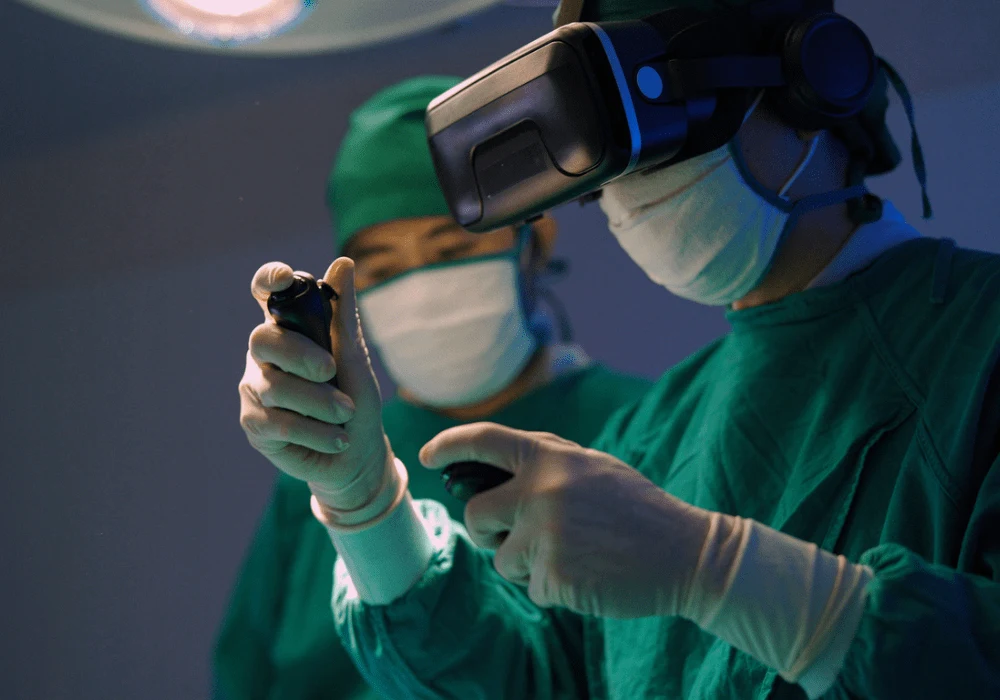Virtual reality (VR) is a rapidly growing technology known for its immersive experiences, particularly in gaming. However, its influence stretches beyond entertainment and finding groundbreaking applications in healthcare. From remote consultations to chronic condition management, VR is helping professionals and patients alike by offering innovative and customisable solutions. As the healthcare sector evolves, VR’s potential continues to expand, improving diagnosis, treatment, and patient care in ways never seen before.
Remote Consultations: A New Frontier
Remote consultations surged during the pandemic, allowing patients to connect with healthcare professionals without risking exposure to the virus. Initially conducted over phone calls and video platforms, these consultations marked the birth of telemedicine. However, virtual reality enhances this process by making consultations more immersive and lifelike. With VR headsets, patients can virtually "step into" a clinic, see their doctor in a 3D environment, and experience an interactive medical consultation from the comfort of their own homes. This level of realism improves communication, allowing physicians to better assess symptoms and comfort patients in ways that conventional video calls cannot.
This technology is especially beneficial for those with mobility issues or individuals living in remote areas. Moreover, VR-based consultations can simulate a doctor’s physical presence, reducing anxiety and increasing the patient’s trust and engagement. By blending convenience with enhanced interaction, virtual consultations through VR mark a significant shift toward personalised healthcare.
VR in Patient and Practitioner Education
Education is one of the most significant areas where virtual reality revolutionises healthcare. For medical students, VR provides a unique platform to study complex anatomical structures and medical procedures in an interactive and engaging way. Instead of watching surgeries from a distance, students can now use headsets to experience virtual surgeries, allowing for better visualisation and understanding. The use of VR in medical education helps students bridge the gap between theoretical knowledge and practical skills in a controlled, risk-free environment.
In addition to learning procedures, students can also immerse themselves in the perspective of a patient suffering from various conditions, gaining empathy and a deeper understanding of their experiences. For practising professionals, VR enables simulation training for high-pressure medical scenarios, helping them refine their skills and decision-making abilities. The technology also offers the flexibility of customised learning, allowing professionals to brush up on specific techniques without the need for physical training spaces or instructors.
Virtual Reality in Mental Health Therapy
Mental health treatment is another area where VR is making substantial strides. Exposure therapy, a common method for treating phobias and anxiety disorders, can now be conducted in a virtual environment. Patients suffering from conditions like social anxiety, fear of heights, or post-traumatic stress disorder (PTSD) can confront their fears in a safe, controlled space through VR. Immersive therapy sessions are designed to simulate real-world situations while maintaining patient safety, allowing individuals to face their fears and gradually reduce their symptoms over time.
VR is also used in mindfulness and chronic condition management. For patients dealing with stress, anxiety, or chronic pain, VR headsets provide a distraction-free environment, creating opportunities for guided mindfulness practices or therapeutic interventions. Patients can learn coping strategies, practice relaxation techniques, and find relief from their condition without the distraction of external stimuli. This approach provides both psychological and physical benefits, improving patients’ overall quality of life.
Enhancing Elderly Care and Autism Therapy
Virtual reality is also valuable in two seemingly different demographics—elderly care and autism therapy. For elderly patients, particularly those in retirement homes or suffering from loneliness, VR offers opportunities for cognitive stimulation and social engagement. Headsets can transport them to their favourite holiday destination or let them enjoy a roller coaster ride without ever leaving their chair. By stimulating the mind and offering engaging experiences, VR can help reduce feelings of isolation and improve mental health in older adults. Additionally, VR experiences have been shown to help improve cognition and ward off dementia by keeping the mind active and engaged.
Similarly, individuals with autism can benefit from VR-based therapy, which allows them to practice social skills and life tasks in a virtual environment. From interacting in virtual social settings to learning skills like driving, VR helps people with autism to navigate situations that may feel overwhelming in the real world. VR's controlled, customisable nature enables individuals to build confidence and develop skills that can be transferred into real-life situations. For both the elderly and individuals with autism, VR is offering new, exciting ways to improve quality of life and foster personal growth.
The application of virtual reality in healthcare is transforming the industry, offering both patients and healthcare professionals new ways to experience and deliver care. From remote consultations and medical education to exposure therapy and elderly care, VR provides personalised, immersive solutions that improve both physical and mental health outcomes. As this technology continues to evolve, its potential to revolutionise healthcare will only grow, creating more efficient, accessible, and empathetic healthcare experiences for all.
Source Credit: Healthcare Digital
Image Credit: iStock






